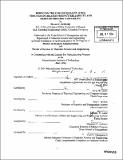Reducing the cost of quality (COQ) through increased product reliability and reduced process variability
Author(s)
Schiveley, Steven C. (Steven Charles), 1974-
DownloadFull printable version (5.491Mb)
Alternative title
Reducing the COQ through increased product reliability and reduced process variability
Other Contributors
Leaders for Manufacturing Program.
Advisor
Alvin W. Drake and Roy E. Welsch.
Terms of use
Metadata
Show full item recordAbstract
Today, Dell, Inc. (Dell) spends millions of dollars each year to prevent product defects from reaching the end customer and to manage those product defects that have escaped to the end customer. The cost of the equipment, labor, and materials to prevent and manage product defects is referred to as Dell's Cost Of Quality (COQ). A large percentage of Dell's COQ is spent by warranty-support and customer service organizations (Services). While the costs of defects most directly affects Dell through the expenditures in such Service organizations, the causes of are found predominantly in other organizations, such as Design, Materials, and Manufacturing. Without a causal link which directly ties the costs of quality defects to the causes of quality defects, it is difficult to justify increased quality-improvement expenditures in product design, product validation, component selection, or manufacturing processes. The Cost Of Quality methodology described here is a practical approach to a) quantifying the financial impact of quality defects, b) shifting the problem-solving focus from "find-and-fix" to prevention, and c) prioritizing quality improvement investments based on expected financial return. This methodology aligns well with Dell's focus on financial performance and has provided the foundation for a COQ program which has been adopted by Dell's Executive Office as one of five top cost reduction projects for fiscal years 2005-2007. This paper provides background on the current tools, process, and culture affecting quality at Dell, describes the financial impact of quality on Dell's business, details the evolution of Dell's COQ initiative, and analyzes five possible methods to sustain the COQ effort.
Description
Thesis (M.B.A.)--Massachusetts Institute of Technology, Sloan School of Management; and, (S.M.)--Massachusetts Institute of Technology, Dept. of Materials Science and Engineering; in conjunction with the Leaders for Manufacturing Program at MIT, 2004. Includes bibliographical references (p. 61).
Date issued
2004Department
Leaders for Manufacturing Program at MIT; Massachusetts Institute of Technology. Department of Materials Science and Engineering; Sloan School of ManagementPublisher
Massachusetts Institute of Technology
Keywords
Sloan School of Management., Materials Science and Engineering., Leaders for Manufacturing Program.